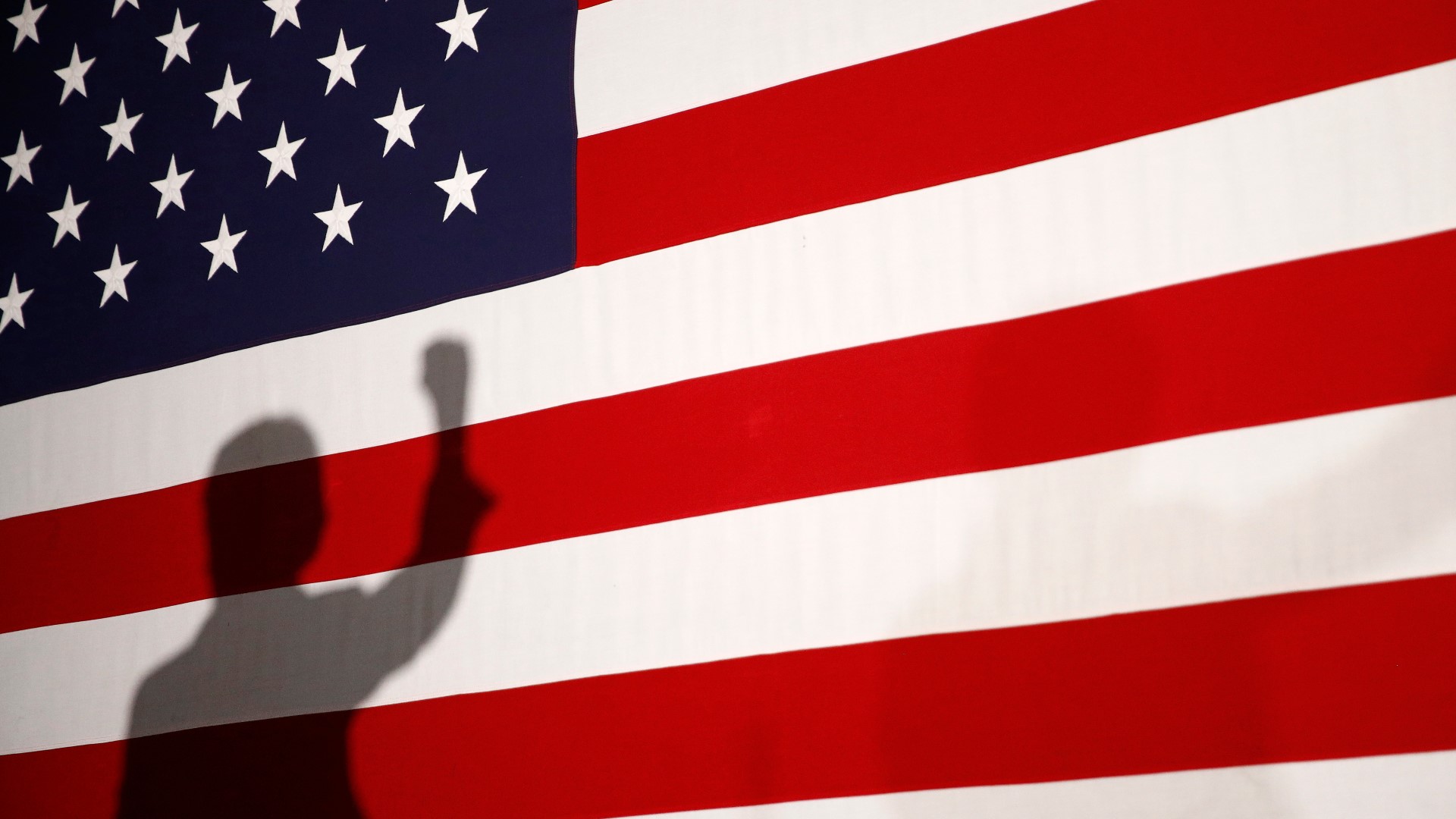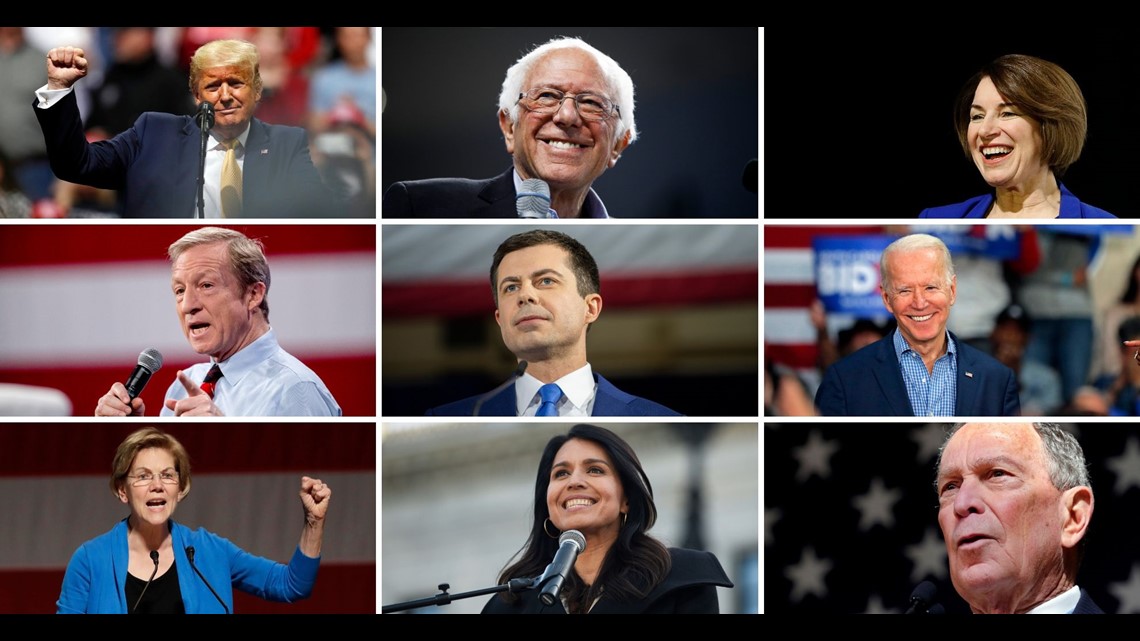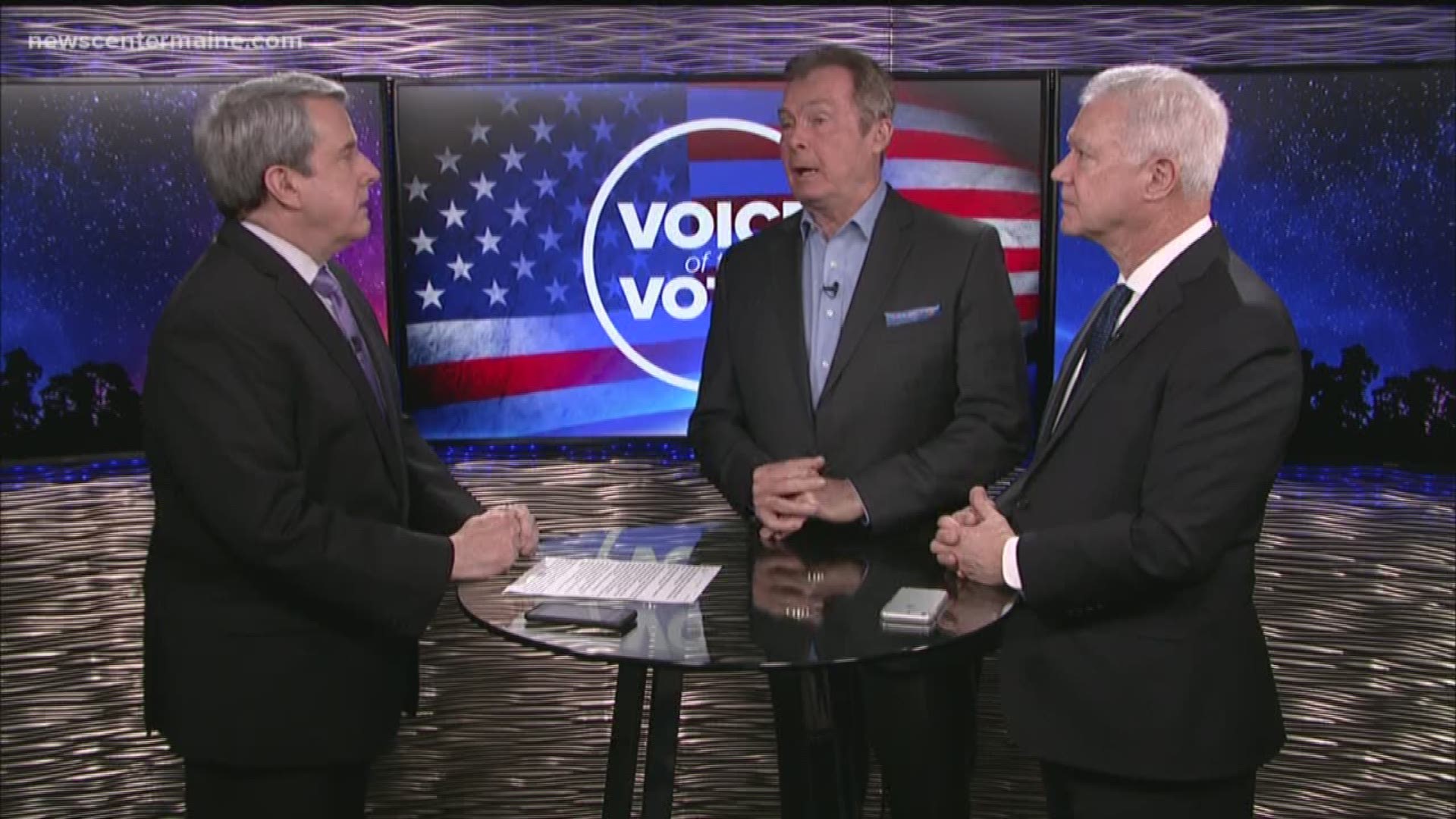Maine Super Tuesday Results Here!
More than 1,000 Mainers voted in a NEWS CENTER Maine poll about election issues. Here are the results and where candidates stand on the issues.

Tom Steyer, Amy Klobuchar, and Pete Buttigieg formally suspended their campaigns before the Super Tuesday primaries.
Live results from Maine's Super Tuesday primary are available here.
2020 Primary Results Polls closed at 8 p.m.
Pres. Donald Trump is the projected winner of the Republican Maine primary, as the only candidate on the ballot. Write-in votes were not counted on the Republican ballot, as no other candidates registered as a write-in 60 days before the election, Maine Sec. of State Matt Dunlap explained.
More than 1,000 Mainers have responded to NEWS CENTER Maine’s ongoing poll about election issues ahead of the primary and general election. The poll lists 12 of the major issues at the forefront of political discourse in the upcoming election: education, environment and climate change, equality, foreign policy, gun control, health care, immigration, infrastructure, labor and business, leadership, military and defense, taxes and the economy.
According to the poll results, health care is Maine voters’ top priority with 54.6%, followed by the environment and climate change (43.9%), and taxes and the economy (42%).
Out of the important issues, we asked which is least important: 22.4% said military and defense was the least important issue, followed by the environment and climate change (14.6%) and gun control (14.3%).
Here’s where the candidates stand on the top issues.


Health care The Medicare for All debate continues to be a top priority for Americans and candidates
Medicare for All: Bernie Sanders, Elizabeth Warren
Medicare for All would replace the current health insurance system with a completely government-run system, essentially eliminating private insurance altogether.
Sanders, who has made Medicare for All the staple issue of his 2016 and 2020 campaigns, says, “We say to the private health insurance companies: whether you like it or not, the United States will join every other major country on earth and guarantee healthcare to all people as a right.”
Warren also supports Medicare for All and says it’s “the best way to give every single person in this country a guarantee of high-quality health care.”
Medicare for all who want it: Pete Buttigieg, Tom Steyer, Tulsi Gabbard
Buttigieg’s plan would allow Americans to opt into an affordable public health care plan and keep private insurance for those who want it. His plan says, “If private insurers are not able to offer something dramatically better, this public plan will create a natural glide-path to Medicare for All. The choice of a public plan empowers people to make their own decisions regarding the type of health care that makes sense for them by leveling the playing field between patients and the health care system.”
As with Buttigieg, billionaire Tom Steyer supports universal health care, but his plan also wouldn’t kick people off their insurance. Steyer’s plan says, “Tom will create a competitive public option to drive down costs, expand coverage, and deliver quality care to everyone who lives here, including the undocumented community. Affordable health care isn’t a privilege just for the wealthy. It’s a right for all.”
Hawaii Rep. Tulsi Gabbard supports a health care for all system, but her plan would also allow individuals to access private insurance if they choose.
Expand the Affordable Care Act (ACA): Joe Biden, Mike Bloomberg, Amy Klobuchar
Former Vice President Joe Biden helped pass the ACA under the Obama administration. Biden says as president he would seek to expand and protect the act “instead of starting from scratch and getting rid of private insurance.”
Billionaire and former New York City Mayor Mike Bloomberg also believes in building on the ACA and would allow people to keep their private insurance. Bloomberg says he would create a “Medicare-like public option” that would be administered by the federal government but paid for by customer premiums.
Minn. Sen. Amy Klobuchar believes the quickest way to universal health care, which she supports, is through a public option that expands Medicare and making changes to the ACA. “[T]he Affordable Care Act is a beginning, not an end, and that changes need to be made on both the state and federal level to bring down health care costs,” Klobuchar’s plan says.
Replace the ACA and privatize Medicare: Donald Trump
Pres. Trump hasn’t released an official health care plan, but signed an executive order in October that lays out the path to shift the Medicare program toward private plans. The Trump administration says, “Replacing Obamacare will force insurance companies to compete for their customers with lower costs and higher-quality service. In the meantime, the President is using his executive authority to reduce barriers to more affordable options for Americans and U.S. businesses.”
The environment and climate change Democratic candidates all prioritize fighting climate change—the only question is how they would.
Pres. Trump has called climate change an “expensive hoax” and he formally began the U.S. withdrawal from the Paris Agreement in November 2019; the process will take a year to complete, meaning the U.S. will officially leave the deal on Nov. 4, 2020, a day after the general election.
The Democratic candidates have all made fighting global warming a top priority—the only question is how they would go about doing that. All the candidates have signed the No Fossil Fuel Money Pledge.
Sanders’ plan calls for “a ten-year, nationwide mobilization centered around justice and equity during which climate change will be factored into virtually every area of policy, from immigration to trade to foreign policy and beyond.”
Warren, an original co-sponsor of Sen. Ed Markey’s Green New Deal, would commit the U.S. to “a ten-year mobilization to achieve domestic net-zero emissions by 2030.”
Buttigieg has a “realistic plan to become a net-zero emissions society no later than 2050 based on a comprehensive set of targets and actions.”
Biden says the Green New Deal is a “crucial framework for meeting the climate challenge,” and has a plan that outlines a “Clean Energy Revolution.”
Klobuchar is a co-sponsor of the Green New Deal; her plan would seek to promote “clean” policies that put America “on a path to achieving 100% net-zero emissions no later than 2050.”
Bloomberg’s 100% clean energy plan would lead a “nationwide push to rebuild American communities and infrastructure with 100% clean energy technology, reducing carbon pollution 50% by 2030.”
Steyer has a “justice-centered” climate plan that will “provide clean air and water, honor the contributions and sacrifice of workers in fossil fuel industries, and prioritize justice for communities that have been treated as environmental dumping grounds for far too long.”
Gabbard’s plan would invest in “green economy.” Gabbard says, “By redirecting the billions spent every year subsidizing the fossil fuel industry to instead invest in the industries of the future — expanding wind, solar, and geothermal — we will guarantee a cleaner, safer energy future and create high-quality jobs.”
Taxes and the economy Stick with us...this is where things get complicated.
The ambitious plans for health care, tuition-free college, and eliminating student loan debt require money, clearly. Candidates have put the pressure on Sanders in recent debates to explain where he plans to get the money specifically for his Medicare for All plan.
Sanders recently released a plan that outlines revenue totals of about $17.5 trillion, however he’s previously estimated his Medicare for All plan would cost around $30 trillion over 10 years. He has not been able to say how that revenue gap would be filled.
His main argument is how much the plan would save Americans money and prevent unnecessary deaths. In his plan, Sanders cites a Yale University study that says Medicare for All would save approximately $5 trillion.
All Democratic candidates have a tax plan that would raise taxes on the wealthy, but they vary.
Sanders has a proposal for a wealth tax that would raise $4.35 trillion over 10 years; he has repeatedly said “billionaires should not exist” and his plan would call for an up to 8% annual tax on wealth over $16 million (for individuals) and $32 million (for married couples). According to analysis from University of California, Berkeley professors, this tax would raise $4.35 trillion over 10 years.
Warren also proposes a wealth tax: her “Ultra-Millionaire (2 Cent) Tax” plan calls for a 2% annual tax on assets over $50 million. “A small tax on the great fortunes of more than $50 million can bring in nearly $4 trillion to rebuild America’s middle class,” the Warren campaign website says.
Bloomberg certainly qualifies as one of the people who would be taxed higher under Sanders’ and Warren’s plans. According to Forbes, Bloomberg is worth an estimated $61 billion.
Bloomberg’s plan would maintain Trump’s 21% corporate tax rate—which was lowered under the Trump administration from 35%—saving Bloomberg’s company roughly $550 million last year. Sanders, Buttigieg, Warren, and Steyer would return the rate to 35%, according to The Washington Post. Biden and Klobuchar would put it somewhere between 21 and 35%, and Gabbard’s stance is unclear.
Klobuchar, Biden, and Buttigieg have more moderate tax proposals than Sanders and Warren, but still plan to raise taxes on the rich.
White House officials say Trump said he will release his “Tax Cuts 2.0” tax plan in September.
When it comes to the economy in general, policies get much more detailed, but all the candidates agree that strengthening the middle class is important. To do that, they all support raising the minimum wage to $15/hour.
Each candidate’s plan for the economy:
Buttigieg: The basis of his plan to strengthen the middle class is to lower costs for families, which includes housing, child care, college, health care, and prescription drug costs. His plan would also raise incomes, which includes expanding the earned income tax credit, ensuring access to paid sick and medical leave, and equal pay for women and people of color, and investments in workforce development and job growth among a slew of other plans. Read Buttigieg’s full economic agenda.
Biden: Biden also believes in rebuilding the middle class, saying “We need to rebuild the middle class, and this time make sure everybody comes along — regardless of race, gender, religion, sexual orientation, or disability.” He lists five major policies to do that: raise the minimum wage, stop overtime loopholes, protect worker’s rights to form unions and collectively bargain, stand up to wage suppression, and put an end to unnecessary occupational licensing requirements.
Sanders: Sanders’ “Workplace Democracy” plan focuses on unions; he says “It was the trade union movement that built the middle class in this country, and it is the trade union movement that is going to rebuild the middle class in America once again.” His other economic plans include: housing for all; expanding social security; free child care and pre-K for all; eliminating medical debt; reinvest in public education; fair banking for all; high-speed internet for all; income inequality tax plan; revitalizing rural America; Wall Street reform; jobs for all; fair trade; and corporate accountability and democracy.
Warren: She ‘has a plan for that’ as her campaign slogan goes, and for the economy, Warren has many: Boost small businesses; Defend and create jobs; Real corporate profits tax; 10.6 million green jobs; End Wall Street’s stranglehold on the economy; New farm economy; Cancel student loan debt; Invest in rural America; Restore America’s promise to Latinos; Paid family and medical leave; Holding Wall Street Accountable; The coming economic crash, and how to stop it; Leading in green manufacturing; Empowering workers through accountable capitalism; A new approach to trade.
Klobuchar: Klobuchar says a strong economy policy calls for affordable education, wage increases, affordable health care, ensuring a secure retirement, investing in infrastructure, creating jobs, focusing on economic justice, and responsible budgeting.
Gabbard: Gabbard’s economic plan focuses on Wall Street and banks. “Millions of Americans have struggled since the 2008 Recession, but Wall Street hasn’t. The banks that were too big to fail then are even bigger today,” the Gabbard campaign website says.
Steyer: Steyer has a “people-powered” plan for the economy. The plan proposes major structural reform “so corporate lobbyists and special interests no longer control our democracy.” Read Steyer’s full economic agenda.
Bloomberg: His “all-in economy” agenda would seek to “strengthen the middle class, invest in education, create good-paying jobs in renewable energy and other industries with a bright future, and open the door of opportunity to every American.” The Bloomberg campaign website says the plan would: invest in local communities to create future jobs, modernize education and training, increase the minimum wage to $15/hour, enhance worker rights and benefits, support entrepreneurship, and better connect rural communities to growth centers. Read Bloomberg’s full plan.
The Maine primary is March 3. Super Tuesday account for 34% of the delegates up for grabs leading up to the Democratic National Convention this July in Milwaukee, Wisc. Maine offers up 24 delegates—compared to the likes of California with 415 and Texas with 228. A candidate needs to cross the 1,991 delegate threshold to get the party nomination at the Convention.
NEWS CENTER Maine will be running its issues poll through Super Tuesday and beyond leading up to the Convention and general election. You can take it here:
An earlier version of this story said a candidate needed to register as a write-in candidate 45 days prior to the primary; the story has been corrected that it is 60 days.


